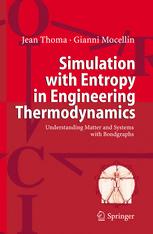

Most ebook files are in PDF format, so you can easily read them using various software such as Foxit Reader or directly on the Google Chrome browser.
Some ebook files are released by publishers in other formats such as .awz, .mobi, .epub, .fb2, etc. You may need to install specific software to read these formats on mobile/PC, such as Calibre.
Please read the tutorial at this link: https://ebookbell.com/faq
We offer FREE conversion to the popular formats you request; however, this may take some time. Therefore, right after payment, please email us, and we will try to provide the service as quickly as possible.
For some exceptional file formats or broken links (if any), please refrain from opening any disputes. Instead, email us first, and we will try to assist within a maximum of 6 hours.
EbookBell Team

4.1
60 reviewsStudents, academics and researchers will find this book an invaluable contribution to the understanding of thermodynamics. In this new treatment of the subject, the authors focus on the principles of thermodynamic variables and the practical simulation of thermodynamic systems, and endeavour to show how simple thermodynamics really is by applying two innovations:
The book opens with thermodynamics as universal science and with entropy as carrier of thermal power, and goes on to consider the effects of friction, including the Carnot cycle. Next, it treats systems with variable mass and variable mass flow and extends the concepts to chemical reactions and osmosis. Finally, descending by some 20 orders of magnitude, it considers single atoms and degrees of freedom of atoms, with statistical aspects of information theory. There are also sections on biology (written in collaboration with Prof. Henri Atlan of Paris and Jerusalem) and on earth science (global warming).
A modern approach with a strong emphasis on interdisciplinary engineering, this book offers a unique view of modern complex systems engineering and its ramifications, and contributes to the advance of pluridisciplinarity among scientists.
The Authors
Prof. Jean U. Thoma: Ph. D. in Physics, Professor of Mechanical Engineering. Originally a physicist who journeyed from hydrostatic engineering to biology through Bond Graphing and author of many books and publications on these subjects.
Dr. Gianni Mocellin, Civil Engineer, Master in Business Administration, Master in Artificial Intelligence, Ph. D. in Economics, user of Bond Graphs, a pluridisciplinarian in the true sense and an accomplished practitioner in psychology, robotics and expert systems.